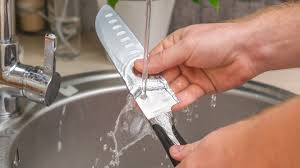Your Cart is Empty
FREE SHIPPING FOR USA

Damascus steel knives are prized for their sharpness, durability, and most of all, their stunning layered patterns. Whether you're using a Damascus kitchen knife, hunting knife, or folding knife, proper cleaning and sanitization are key to preserving its performance and appearance for years to come.
This complete guide will teach you how to clean and sanitize a Damascus knife safely, prevent rust, and extend its lifespan — without damaging its signature look.
Damascus steel is made by forging together multiple layers of hard and soft steels. This makes the blade extremely strong, but also more reactive to moisture and chemicals compared to stainless steel.
Cleaning your Damascus knife after each use prevents:
Rust and corrosion
Cross-contamination of food
Damage to the etched pattern
Loss of sharpness and performance
If you're investing in a hand-forged Damascus knife from Jun Knives, proper maintenance is essential to keep it looking and cutting like new.
You should clean and sanitize your Damascus knife in the following situations:
Raw protein can carry harmful bacteria like Salmonella or E. coli. Always clean the blade immediately after cutting meat to avoid foodborne illness.
Don’t use the same knife for meat, fruit, and vegetables without cleaning in between. This prevents:
Cross-contamination
Transfer of allergens
Unwanted flavor mixing
Foods like lemons, tomatoes, onions, and vinegar can:
Tarnish or corrode the blade
Dull the edge
Fade the etched pattern
Clean your Damascus knife right away after handling these ingredients.
If your knife touches:
The floor
Dirty countertops
Used cutting boards
Sanitize it before using again — even if it looks clean.
Here’s a safe and effective method to clean your Damascus knife without damaging the blade.
Rinse the blade under warm (not hot) water to remove food particles and residue. This also softens any stuck-on debris.
❌ Avoid soaking the knife — prolonged exposure to water may lead to oxidation.
Apply a small amount of mild dish soap to a soft sponge or cloth. Gently scrub the:
Blade (both sides)
Handle
Tang (if exposed)
⚠️ Never use abrasive scrubbers, steel wool, or scouring pads — they can scratch the blade and remove the pattern.
Rinse the knife again under warm water to remove all soap residue. Leftover soap can cause spotting or dulling of the blade.
Use a clean, soft, lint-free towel to dry the knife completely. Make sure to:
Dry around the handle and tang
Avoid air drying (which can lead to moisture damage)
Never leave the blade wet or damp
Sanitizing kills invisible germs and bacteria. This step is crucial after:
Cutting raw meat or seafood
Contact with dirty surfaces
Preparing food for others
Use a spray or wipe labeled "food-safe kitchen sanitizer."
Apply to the blade
Let sit for 30 seconds to 1 minute
Rinse with warm water and dry
Mix 1 tablespoon bleach into 1 liter of water.
Use a clean cloth or sponge to apply to the blade
Let sit briefly (no more than 1 minute)
Rinse thoroughly and dry immediately
⚠️ Do not soak Damascus blades in bleach. Overexposure will damage the pattern and corrode the steel.
To protect against rust, especially in humid environments, lightly oil your knife after cleaning and sanitizing.
Best oils for Damascus knives:
Food-grade mineral oil
Camellia oil
Tsubaki oil (commonly used in Japanese blades)
Apply a thin coat using a soft cloth, and wipe away excess. This forms a moisture barrier on the blade.
Proper storage is just as important as cleaning.
Do store in:
A dry leather sheath (for short-term storage or outdoor use)
A wooden knife block
A magnetic strip (non-metallic backing to avoid scratching)
Don’t store:
In the sink or dishwasher
In humid, enclosed containers
In leather for long periods (unless fully dry)
Always hand wash — never use a dishwasher
Dry immediately after rinsing or cleaning
Avoid cutting on hard surfaces (like stone or glass)
Use separate knives for raw and cooked foods
Sanitize regularly, especially when preparing food for others
A clean Damascus knife is a safe, sharp, and long-lasting tool. Whether you're using it in the kitchen, in the field, or simply as a collector’s piece, regular cleaning and sanitization will keep your blade in prime condition.
At Jun Knives, we handcraft every knife using centuries-old forging methods. Taking a few minutes to clean your blade the right way ensures it continues to perform — and look — like a masterpiece for years to come.